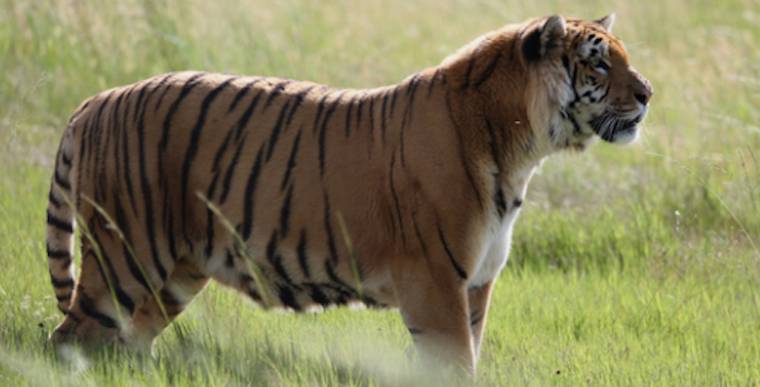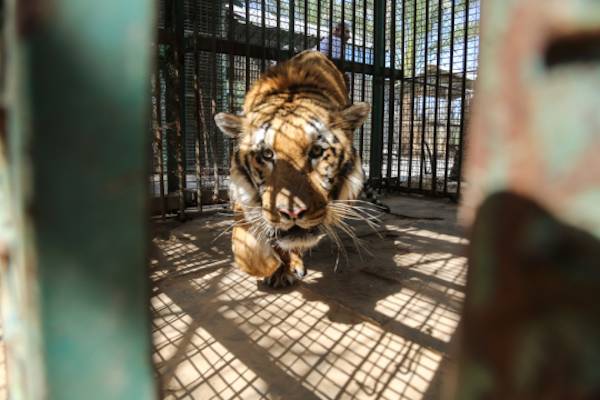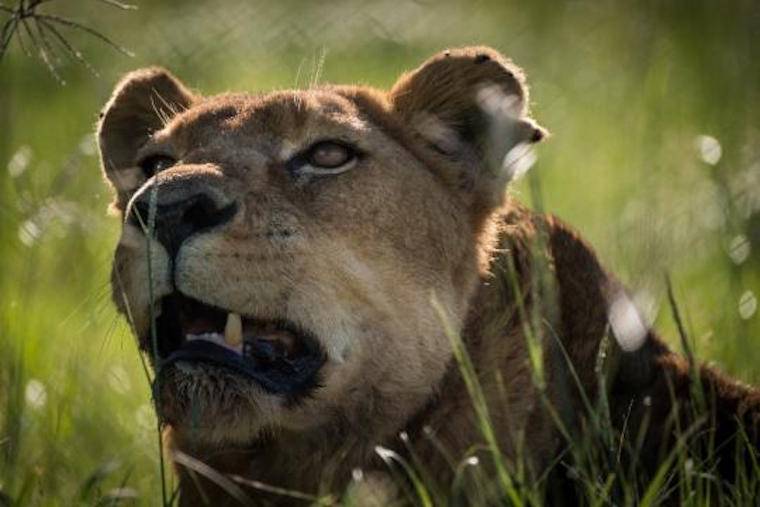
A Wild Love
From All-Creatures.org Animal Rights Activism Articles Archive
FROM
Claire LaFrance, Four
Paws
February 2018
This is the real selfless kind of love that transcends pretty much everything- even species... rescuing and relocating big cats. A prospective of our work that most people either don’t understand or don’t think about.
We are in it for the long haul. We are in this not just for the sensationalized rescue and extraction from some dangerous local. We are in this for the years, the decades of food and space and ever-changing enrichment needs. We are in this to grow old together. That is what it means to care for someone for the rest of their lives.

This is a love story. Probably not the one you are expecting.
This love is not the simple kind. Nor the love-at-first-sight kind. This
love you won’t see in Rom-Coms or read in the Modern Love column of the New
York Times (of which, let’s be real, I am a die-hard fan).
Instead, this is the real selfless kind of love that transcends pretty much
everything- even species. I wanted to share a little about this love with
you; a prospective of our work that most people either don’t understand or
don’t think about.
I repeatedly return to the story of the tiger Laziz and the so-called “Worst
Zoo in the World”. I often bug our staff at
FOUR PAWS’ Big Cat Sanctuary LIONSROCK, for Laziz updates. The tiger
ended up at our 3,080+ acre park in South Africa where we provide him and
roughly 100 other big cats an appropriate, lifelong home. Laziz was rescued
from Gaza and brought to LIONSROCK in the summer of 2016. After undertaking
six emergency missions in the Gaza strip, FOUR PAWS’ last mission was to
return and closedown the Khan Younis Zoo, a bombed-out facility that was
notorious all over the world for continuing to display dead and mummified
animals to its dwindling patrons. This is where we came into caring for
Laziz, the last pet tiger of Gaza. Laziz had endured years of suffering in a
desolate cage, lack of food and fresh water and the variable drone of an
active military conflict in and around his enclosure. I bring him up not
only because I love him but because his story is a testament to the
long-term love I am describing.

It is easy to say, I love animals. But the decision to love these kind of
animals, wild animals, means doing what is best for them. This means
providing them with the most natural habitat for their species and one that
suits their individual needs. Loving these animals means taking them on, all
of them, all their captive-bred neurosis, their aggression, their bonds,
their health issues and even their signs of trauma.
Taking on these wild animals - who should have never been in captivity in
the first place - is like loving that bad boy from high school that drove a
motorcycle and that your mom warned you about. He will only break your
heart, she cautioned. But you don’t listen.
And I have never stopped loving the bad boys, the hard cases, the wild
cards. That is why I enjoy the work we do here and this organizations
dedication to the animals in our care. Even the animals that are hard to
love along with the ones that make your heart melt instantly.
Laziz is one of these bad boys. Once at LIONSROCK, his development was slow,
mired by setbacks (the area was hit by a hail storm sending the tiger into
his den for a few days). Our behavior specialist and keepers work closely
with the tiger, gaining trust, building his confidence back. Being at a
world class facility like LIONSROCK is the best possible outcome for large,
dangerous animals. Laziz has access to top-notch veterinary care when it is
needed and freedom when it’s not.
Tigers like Laziz need the right kind of love. Love in the form of
specialized care, not coddling. They don’t need belly rubs or cuddle
sessions. They need space and time and enrichments items to play and tear
apart on their own. They need time to remember what being a tiger is all
about. And they certainly cannot do that with cameras in their face and
hands holding their fur.
Have you ever heard the saying “If you love something, let it go?” I think
in this organization we take that seriously. Our sanctuaries are the closest
thing to the natural world that is species appropriate. The closest thing to
“letting them go” that we can get while keeping them safe and healthy.
When FOUR PAWS decides to rescue an animal, we decide to take the
responsibility of that animal’s physical, emotional and psychological health
for the rest of their lives. This often means decades of exhaustive facility
upkeep, building on top of intensive specialized veterinary care. This love
does not come cheap.

There is a lioness in our care, Emma, who is one of our first new
residents at LIONSROCK. Emma is an astonishing 25 years old (almost double
the life expectancy of the big cat in the wild!). She was a member of a
group that we rescued from an Austrian Safari Park outside of Vienna after
they hit financial troubles and could no longer care for the 10 lions. Emma,
because of her age, lives in our special care unit. Outside of growing old
or other health concerns, a rough estimate for housing, feeding and caring
for one big cat sits around $36,000 a year. This excludes the cost of the
actual initial rescue and/or transfer and the building of additional
enclosures. That is one expensive date!
Like all 97 big cats at LIONSROCK, Emma has her own history and her own
individual character. There is no one-size-fits-all for caring for large,
wild animals. And we respond to that fact with careful monitoring and
adapting our care to suit their needs.
But, like all wedding vows promise, we are in it for the long haul. We are
in this not just for the sensationalized rescue and extraction from some
dangerous local. We are in this for the years, the decades of food and space
and ever-changing enrichment needs. We are in this to grow old together.
That is what it means to care for someone for the rest of their lives.
For an organization like FOUR PAWS, this means an aging population of lions,
tigers and bears at our sanctuaries and in our care. This will also mean
tackling those old-age related-health problems. Each new day is a new
challenge in the mission to protect these incredible animals from suffering
and exploitation.
But the good news - the happy ending here- is that our love transcends time.
Time for Laziz to learn to be a tiger again without the sound of bombs and
gunfire around him. Time for Emma to live out her old age with comfort and
security. And time for us to keep on caring for them, albeit from distance.
And this may just be the best love story I have ever heard.
text
Return to: Animal Rights Activist Strategies








